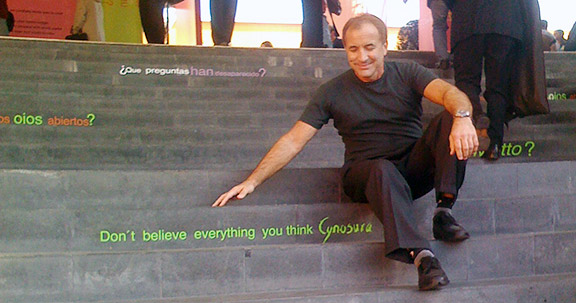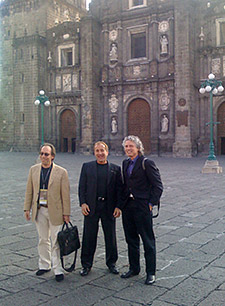On the Road with Michael Shermer
(Or, The Chronicles of Skeptica) Part 1
I have never kept a diary — the narrative recounting of daily events — mainly because most of my daily routine is uneventful and uninteresting. Like everyone else, I’m a creature of habit. If it is Tuesday or Thursday morning, I’m doing the “Barry Ride” with my cycling buddies (so christened because it was started in the 1980s by Barry Wolfe, a National Champion cyclist who passed away a couple of years ago), a two-hour loop through the hills of Glendale and La Canada. (I may someday write a book entitled Tuesdays with Barry, recounting the conversations we have had during the ride over the past 20 years on all manner of topics from the sublime to the superficial.) After the ride I pick up a 20-oz. Latte at the Coffee Gallery in Altadena, stop by the P.O. Box to pick up the Skeptics Society mail, then go into the office for the rest of the day. If it is Wednesday we ride our bikes to Mt. Wilson, a 20-mile climb (followed by a 20-mile descent), then I hang out at the Starbucks in La Canada for a couple of hours, writing and editing without phone interruptions, then to the office. If it is Monday I work all day in the office. If it is Friday I write at home for a couple of hours, then take my step-dad out to lunch, trying out different burger joints around Southern California (and, when needed, drive him to his various doctor appointments, which have grown more common now that he is in his 80s). If it is Saturday morning I’m with the boys again, hammering through a 4-hour ride in the mountains, rotating weeks through four different routes, one flat and the other three monstrous leg-breaking climbs. Sundays are my secular Sabbath, just hanging out at home and doing my best to be unproductive. Best of all, every weekday morning I drive my daughter to school — the best 20 minutes of my day — as we get uninterrupted time to talk and/or listen to audio books (latest one — The Year of Living Biblically by A. J. Jacobs, an hilarious account of trying to literally follow the hundreds of commandments in the good book). As I said, nothing to write home about.
This prosaic schedule is occasionally interrupted by lecture trips at various locals, mostly colleges and universities, a few scientific conferences and, once in awhile, corporate events and so-called “big idea” conferences, such as TED (Technology, Entertainment, Design — www.ted.com). A TED clone I am at today, from which I am writing this first chronicle entry is called “La Ciudad de las Ideas” — The City of Ideas (the city is Puebla, Mexico) — “a festival celebrating the creativity of humankind.” It is the brain child of Andrés Roemer, a Harvard trained public policy analyst with a passion for bringing big ideas to the general public, especially young students. Although the price of admission would have made Sarah Palin’s wardrobe director blanch (around $2,000 a head), hundreds of students were granted scholarships to attend, and all told nearly 3,000 people were packed into the Puebla convention center. The theme was “Don’t Believe Everything You Think,” and it was plastered on everything from coffee mugs to stair steps (see photo below)

on the steps of the Puebla convention center
The hotel we’re staying at, Camino Royal, is reasonably nice but not quite up to the images available on its webpage, which through careful lighting turns this 3-star hotel into a 5-star resort. I might have given it four stars were it not for the showers, out of which the water barely dribbles, forcing you to have to lean in under the showerhead to get wet, and then after soaping up it takes quite a few California Minutes (the slow-paced version of the New York Minute) to rinse it all off. But at least it’s hot dribbling water.
On our way over to the convention center, Lawrence Krauss, Steve Pinker, and I quietly slipped into the city’s largest cathedral in search of our inner saints. I dubbed us “the three amigos” (see photo below), but the interior of this church was no laughing matter as it rivals any of the grand European cathedrals from the late Middle Ages. (There are supposedly 365 churches here, one for every day of the year — now that’s serious religion.) One cannot help being awed by the power and majesty of its aspiring domes and shear size. To the 17th century minds who frequented this place it must have elicited the same sense of awe and transcendence we moderns receive from the visual products of our grand telescopic domes.

Lawrence Krauss, Me and Steve Pinker — “the three amigos” — in front of the Puebla Cathedral
The roster of speakers was nothing if not diverse, and nearly everyone brought their A game to the stage. Appropriately, we began at the beginning with cosmologist Lawrence Krauss delivering a tour de force of a tour of the universe, from the big bang to the heat death, and how we know it. A British philosopher named Eric Olson explained his theory of personal ontology, or how we know who we are, through a series of thought experiments (do philosophers run any other kind?) involving the transplantation of organs. If I get a new liver, I’m still me, but the liver gets a new body. If I get a new brain, I’m history and someone else gets a new body because personhood is located in the brain, not the liver (or other organs). After 20 minutes of stick-figure diagrams (just in case we couldn’t follow the logic), Olson ended by asking us to consider if Terry Schiavo was a person or a body. (Recall that Schiavo was the women in the persistent vegetative state whose feeding tube was pulled, causing Congress to call an emergency session to answer the ontology question for her husband.) I thought that maybe I had spaced out and missed something deeper because it seemed to me that the answer depends entirely on how you define a person, but the philosopher Dan Dennett, sitting next to me, confirmed that I hadn’t missed anything.

Puebla Cathedral (interior)
My favorite talk of the day was by the evolutionary psychologist and linguist Steven Pinker, who packed his 21 minutes with copious data showing that when it comes to objective measures of crime, violence, aggression, and war, these are the good ol’ days. Despite what we hear on the news (the recency effect and availability heuristic apply here), all such measures show that as a percentage of the population fewer people die today by crime, violence, aggression, and war than any time in history. Why? My answer, in The Mind of the Market, is Bastiat’s principle: “Where goods do not cross frontiers, armies will.” That is, free trade across open economic borders obsoletes political borders and decreases the likelihood of two nations going to war. Pinker confirmed this and added to it the liberalizing effect of democracy, with its attendant institutions of law and order, equal justice, civil liberties, etc. Later, over a beer, Pinker cited research that identified the big three deterents to war: liberal democracy, free trade, membership in international organizations (e.g., U.N., E.U.).
The first day ended in a debate on whether religion is a force for good or evil in the world, with Dan Dennett and I on one side and conservative social commentator Dinesh D’Souza and Islam scholar John Esposito on the other. It turned out to be quite a lively show, starting with the stage set up as a boxing ring in the middle and the theme from Rocky playing during our introductions. Hokey, yeah, but it sure woke the audience up after a late lunch (lunch in Mexico is around 4pm). I thought Dennett and I made good tag-team wrestling partners, but Esposito held fast to an academic analysis of the question (“on the one hand … on the other hand…”). After the debate we were inundated with students who wanted us to autograph their programs and snap cell-phone photographs, which sort of surprised me because when I had earlier asked for a show of hands of how many believers were there, almost every hand went up. Puebla, you see, is the most Catholic city of this most Catholic country, where something like 99% of everyone is a believer and 98% are Catholic, so I was surprised to hear so many students tell Dennett and I how much they agreed with our position.
I’ll continue the conference summary in my next blog post…
[webmaster broke this post into two parts. Some comments below are relevant to part 2]

So that explains why I and many other women are so attracted to guys who turn out to be gay!
sorry, but have to point out….
“with Dan Dennett and I on one side”
–>
“with Dan Dennett and me on one side”
The question I have, is what did Michael Shermer talk about?
Thanks for this interesting ‘summary’. As ‘Stephen’ said, tho’, what DID “…Michael Shermer talk about?” ?
“Since the science shows that homosexuality is not a choice, one solution to the political civil liberties issue is more science research and better science education.”
Come now: correlation, causation. Are people okay with gay marriage because they think gayness isn’t a choice, or do they think that gayness is a choice because they’re against gay marriage? Ask yourself which you see more of: people basing their political positions on their understanding of science, or people distorting science to match their political positions.
I was especially interested with the talk about Bastiat’s principle. I’m a Colombian and I think that is waht’s going on with my country and Venezuela. Our neighboring dictator had some kind of ego fight with our president, at that point Mr. Chavez sent tanks and the army towards the border. He announced also announced some economic measures and penalties against colombia and has been threatening with war ever since. The fact is that he hasn´t been able to do anything to Colombia, we provide a high percentage of food and other basic goods to venezuela like meat, milk, rice, all kinds of stuff. The second problem is that many wealthy venezuelans also bring goods here, own companies here and conduct business here in Colombia. Many Venezuelan jobs can be attributed to ecnomic integration. I don´t think that free trade prevents wars, it is ECONOMIC DEPENDANCE
In the end I think that money is more important than any war or ideology, lol…. People will not quarrel with each other when BOTH their pockets are affected.
Homosexuality is 50% genetic now? I thought it was 30% genetic. When scientists come up with a blood test for sexual orientation, that’ll be pretty convincing that people are born that way.
Do you think pedophilia is a choice or are people born that way? Either way, ACTING on their urges is a choice.
Max,
I know where you got the 30% figure from and I think you’ve fallen victim to confirmation bias. Someone can correct me if I’m wrong but as far as I’m aware the prenatal environment makes up the other 70%. The SGU talked about that study on a podcast, but I can’t remember which one. Anyway I’m sure if you found it and had a listen you’d find it very informative.
Oh and moving to paedophilia is a bit of a red herring. Acting on homosexual urges is not child abuse. In regards to paedophilic choice, I can’t see how anyone would choose to be a member of the most hated minority on the planet.
Michael, really, I thought your grammar was better than this: “I was surprised to hear so many students tell Dennett and I how much they agreed with our position.”
Grammar gasp! “…reminding the audience that her and Barash have been faithfully married for over three decades.”
Guys:
It’s rude to comment on people’s grammar when they’re sharing their day with you…it’s tantamount to correcting a love-letter on spelling or punctuation.
Comn, that’s this is an informal medium. Don’t be pedantic ‘yall. It may close down the blog and I am enjoying thus far.
Thanks, Michael, for sharing your impressions with us.
Really, gang, we’re better than this.
chaz mena
/agree with Chaz!
I too am interested in at least reading a transcript of what Michael Shermer spoke about.
While Mexico is mostly a catholic country, it also has a long history of laicism since 1870 ( and even a war about religion in 1930). Today in México about 80% of catholics aprove anticonceptives, and 55% aprove abortion.
In México a Politician never speaks of god, or he will be recriminated by the press. Our last president (from the conservative party) was heavily critisized because he did that, so our curent president, from the same party, never does that.
That will help you understand the students reaction.
Not to be nit-picky here, Abelardo, but free markets create economic dependance. The result of increased trade becomes dependance through specialization. Of course, just about any way to prevent war is a good one.
I’m glad Michael didn’t participate in the political comments. Such comments are inappropriate in the context of a scientific meeting.
For those who feel the need to apologize for our president, keep in mind that whatever its faults, our country has some good qualities: in many other countries such an apology would have earned them a jail term or worse when they arrived back home.
Harriet:
The president is not the country, he is its highest executive. It is NOT treasonable to remind ourselves how much of a dweeb he is, how far back he’s taken us, and how arrogant he is in his ignorance.
I, for one, am embarrassed that we re-elected him. I am pissed, frankly, that we need to be reminded of our ever-shrinking civil liberties whenever we are critical of the present administration. That the executive power of the federal govt. worked towards a pluto-theocracy is evident.
“…power and majesty of its aspiring domes and shear size.”
Barbers of the Gods? Or just a really big flock of sheep?
In the end I think that money is more important than any war or ideology, lol… People will not quarrel with each other when BOTH their pockets are affected.
Excusez-moi si ma langue française n’est pas extraordinaire mais je trouve tout ceci excellent. Merci pour le blog et cet articleBonne continuation.